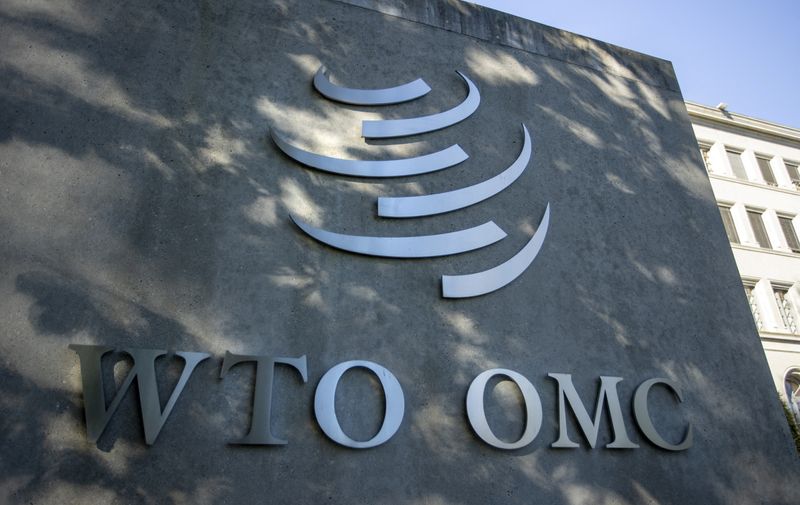
© Reuters. FILE PHOTO: A logo is seen at the World Trade Organization (WTO) headquarters before a news conference in Geneva, Switzerland, October 5, 2022. REUTERS/Denis Balibouse/File Photo
By Emma Farge and Rachna Uppal
ABU DHABI (Reuters) -World Trade Organization (WTO) negotiators failed to break a deadlock on major reforms on Friday despite talks extending deep into overtime in Abu Dhabi, in what some delegates said was a triumph of national interest over collective responsibility.
Talks ended early on Saturday after five days of negotiations which failed to see breakthroughs on major negotiating topics like agriculture and fisheries. However, a moratorium on placing tariffs on e-commerce duties was extended by two years, in a relief to businesses.
“On the big ticket items that are essential for the mandate that the WTO wants to sort out, the fisheries, the harmful subsidisation, that just did not happen, because there was not the spirit of give and take,” a senior European official said.
On the fifth day of the ministerial meeting, most ministers had already gone home, although India’s Piyush Goyal and European Trade Commissioner Valdis Dombrovskis remained.
Goyal was seen smiling and shaking hands outside a meeting room late on Friday as delegates gathered in small groups next to a coffee stand. Goyal met with WTO Director-General Ngozi Okonjo-Iweala and the meeting’s chair, UAE Minister of Foreign Trade Thani Al Zeyoudi, in two separate meetings.
“We have not lost out on anything. I go back happy and satisfied,” Goyal told reporters as talks started to wind down.
WTO spokesperson Ismaila Dieng had earlier said the discussions were “intensive and difficult”.
India, along with South Africa, had opposed extending a moratorium on digital trade tariffs – a move that has overwhelming support of most governments and from business, but later relented.
WTO talks have failed before and this year’s negotiations, held in the oil-rich Gulf state the United Arab Emirates, has highlighted fissures between some of the world’s top economies.
“We’ve worked hard this week, we have achieved some important things and we have not managed to complete others,” said Ngozi Okonjo-Iweala in the closing session.
BRICS DISAGREEMENT
U.S. President Joe Biden’s trade chief Katherine Tai said in an interview with Reuters late on Thursday that if talks failed, fragmentation among the BRICS group would have contributed.
India and China, core members of the BRICS group of nations, have disagreed on key issues including on investment. India’s commerce minister joined the negotiations two days after they started and after his Chinese counterpart had left Abu Dhabi.
Pacific island nations have also complained at the talks about feeling marginalized and overlooked by most major powers.
U.S. support for global trade and multilateral groups like the WTO has been renewed under Biden. But negotiators are mindful that former President Donald Trump, who disrupted the multilateral system, could win a second term in the U.S. presidential election in November.
Earlier in the week, even the formal acceptance of completed negotiations on improving investment was blocked at an organisation where all 164 members must agree by consensus.
A consensus on major deals would have elevated the UAE’s status as a global interlocutor, as it seeks to place a bigger emphasis on multilateralism and dialogue, a turnaround from the assertive foreign policy it was pursuing a decade ago.
It has served as a non-permanent member of the U.N. Security Council, hosted the U.N. COP28 Climate Conference, joined China and India as members of the BRICS grouping of nations and established ties with Israel.
Source: Investing.com




























